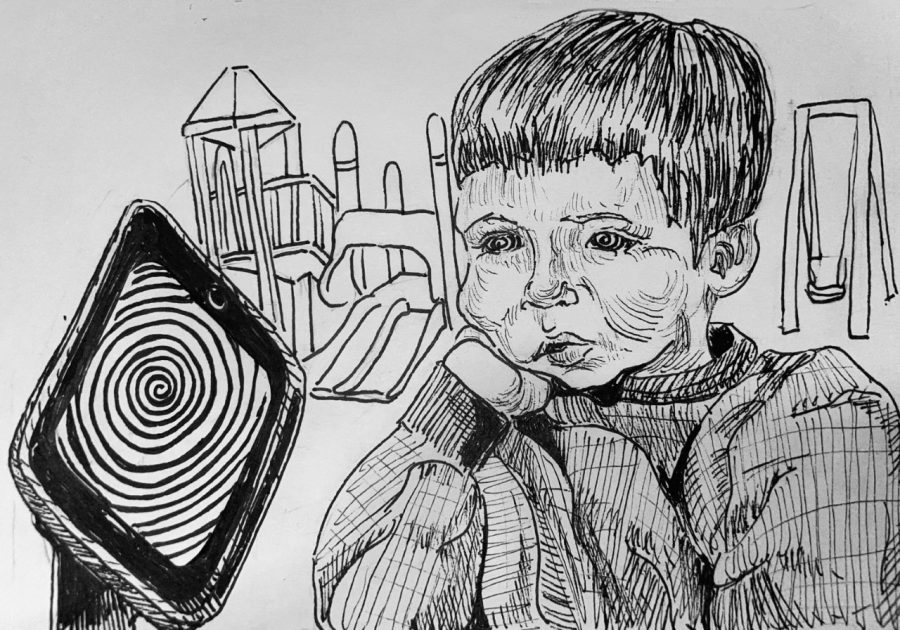Your donation will support the student journalists of Omaha Central High School. Your contribution will allow us to purchase equipment and cover our annual website hosting costs.
OPS iPads harmful to students
March 31, 2022
When the OPS school board unanimously voted to invest in iPads for every student, it seemed a strong move for equitably keeping students on track in school. But the iPads have proved to do far more harm than good It turns out putting devices with the same potential for addiction as cocaine into the hands of young children is not great for them. The mental and physical health as well as learning of children in Omaha has suffered since the introduction of iPads. Not only are students now spending the majority of a school day on their screen, the addiction from this much screen time, means they are choosing to spend their free time on screens as well. The mathematical fact is the more time that is spent on a screen the less they can spend on normal developmental activities. “There is definitely a reduction of social interaction with kids, kids using their imagination, or even moving their bodies,” said Veronica Wang, mother to a kindergartner at Jackson Elementary.
Already there have been major implications for physical health. With kids spending more time on screens than ever, naturally they are moving less than ever. Thus, childhood obesity in Nebraska has seen a 3% increase just from 2019 to 2020, according to data from The Wood Johnson Foundation. Children who develop obesity are more likely to stay obese throughout their lives, leading to life-threatening conditions such as diabetes, stroke, hyper tension, eating disorders, and heart attacks. The other big physical problem with screens is their impact on sleep. The blue light from screens, even during the day, delays the release of melatonin, decreasing the amount and quality of sleep that growing children and teens desperately need.
Mental health has been equally severely impacted. First of all, solely by the struggle of addiction. “ My son has told us when he has choice time in school, in after school care , or even riding the bus, he chooses to be on the iPad,” says Wang. Even when off the screen, children are struggling mentally. “Emergency admissions for mental health problems among adolescents were up 31% from the previous year,” says a 2020 report by the CDC. I personally know more than five teenagers who make up this percentage. This data cannot be looked at as separate from the sharp increase in screen time since the iPads were distributed in of 2020. Screens visibly hurt mental health by replacing social skill development through real interaction with an altered reality that lowers self esteem. This creates anxiety, loneliness, depression, eating disorders, and so many other mental illnesses and struggles. Just look at the hallways of Central and take note of the record number of fights thus year.
While the original goal of the iPads was to keep kids on track academically amid a pandemic, it has been not been very effective in this regard either. “I am concerned that the time on iPads has the potential to take away opportunities throughout each day to work together and learn as a whole group,” says Meghan Little, a former elementary school teacher and mother to a first grader at Washington Elementary. As a Central high school student I can easily say that the majority of students learned far less than before, if anything, with all the new abilities to cheat that online school and online work provides. This is backed up by the standardized MAP testing failure rate of OPS going from 19.2% to 34% in 2021. Much of what is memorized in school is forgotten by adulthood anyways, so less subject retention is not even the biggest issue. It’s the impact that iPads will have on students’ ability to learn and think critically about anything at all later in life. According to a study by the National Health Council, “Children who spent more than two hours a day on screen-time activities scored lower on language and thinking tests, and some children with more than seven hours a day of screen time experienced thinning of the brain’s cortex, the area of the brain related to critical thinking and reasoning.”
Seven hours is a school day. And OPS has made iPads a classroom tool more necessary for school than a pencil. It is downright dangerous of OPS to be putting this much unavoidable screen time into the lives of young students.

